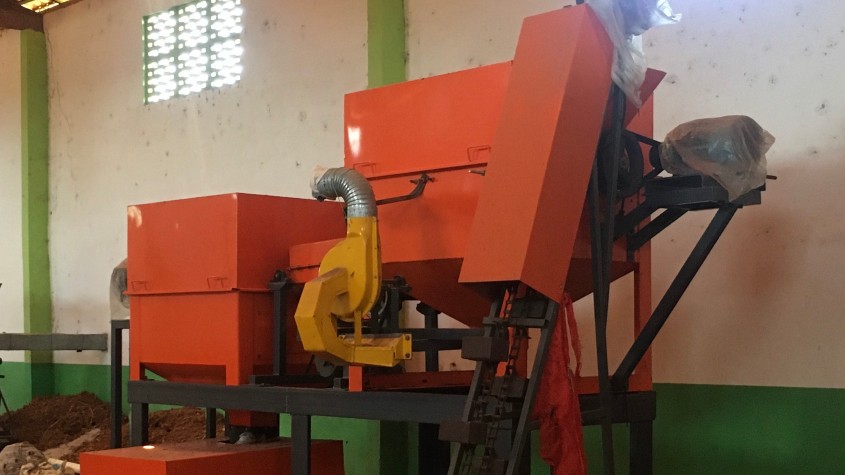Interview: SMEs for a Better World
June 26, 2020
By Lidia Kleshchenko, Associate Program Officer, Global Challenges Division, WIPO
To mark Micro-, Small and Medium-sized Enterprises Day, celebrated annually on June 27, WIPO GREEN has prepared a special interview with Ms. Gianna Sagazio, Director for Innovation at the National Confederation of Industry - Brazil (CNI). This conversation includes reflections on trends in green-tech business, the role of women in small- and medium-sized enterprises (SMEs), and tips for green entrepreneurs.

Scientific and business research shows the importance of female leaders for organizations. I believe that women can offer unique skillsets to promote innovation, and we can work together to make companies more sustainable and environmentally-friendly.
Gianna Sagazio
WIPO GREEN: Dear Gianna, thank you very much for your interest in doing this interview. As a platform supporting global efforts to address climate change, our first question is related to this topic.
How do you see the role of SMEs in solving the global climate crisis?
Innovation is the main and essential path for the world to advance the climate change agenda, overcome the new coronavirus pandemic and address several other issues. Already today, it is the objective of many SMEs that are shifting their functioning and production towards reducing their impact on the environment. On a global scale, SMEs are the starting points for promoting the comprehensive changes required to reduce greenhouse gas emissions.
For example, many Brazilian companies have been investing in developing innovative products that combine technology with environmental conservation. Enterprises such as Pharmakos D´Amazônia and Biotechnos Projetos Autossustentáveis presented their innovative green technologies during a seminar sponsored by CNI “Innovating is developing the industry of the future” in August 2019. Another example is that of GranBio, a pioneering company in the field of industrial biotechnology that has evolved from a user of biotechnologies to a developer and consolidator of knowledge and intellectual property in bioenergy, biochemicals and renewable materials. GranBio has made it a priority to spread sustainability processes throughout its chain.
Featured technology

Babaçu coconut processing machine
Biotechno, Brazil
Biotechnos' innovative technology automatically processes the babaçu coconut, a natural resource, 99% of which is wasted using the current manual processing practices. The technology not only allows for 100% use of the coconut (for cosmetics, food, etc.), but also improves working and health conditions of coconut breakers, mainly rural women.
In emerging markets, and in particular in Brazil, what are the trends for eco-friendly SMEs?
In Brazil, we have been encouraging the adoption of an agenda designed to foster entrepreneurship and improve conditions for innovative entrepreneurs to operate their businesses, always keeping in mind that innovation and sustainability go hand in hand. This agenda is supported by making funds available for investment and fostering partnerships between businesses, governments, universities and research institutions.
Similarly, to stimulate innovation that offers value to society, Brazil’s National Institute for Industrial Property (INPI) launched a fast-track Green Patents Program, which accelerates patent applications for greentech inventors who meet the requirements. The pilot program started in April 2012 and, as of December 2016, the fast-track Green Patents Program has become a permanent service INPI provides.
We are seeing an increase in innovation that meets human needs without neglecting concerns about the environment and sustainability. From my experience, SMEs that incorporate the innovation and sustainability agenda into their processes, as a rule, achieve competitive advantages. We have multiple examples in Brazil, such as the aforementioned companies, or another small company, Norvinco, that created an eco-thermal box combining the use of cardboard and recyclable polypropylene plates to replace polystyrene foam. The product keeps items refrigerated, is reusable and recyclable, and provides logistical advantages for storage solutions because it is dismountable.
On the other hand, these companies inevitably face challenges. In general terms, larger and more integrated companies are more likely to carry out research, development & innovation (RD&I) activities focused on sustainability, since the costs and risks associated with these efforts are better supported by large, robust and diversified structures from the production and financial point of view. However, SMEs in Brazil are aware of this reality and often successfully overcome such challenges by creating enabling conditions for both process and product innovation, and adopting sustainable development and innovation models as means to improve their competitiveness.
What role do you see women playing in the green business space in the next decade?
Today, women globally are still grossly under-represented in scientific, managerial and innovation activities. Even when women are more educated, men typically enjoy higher levels of employability and earn higher wages. For example, in Brazil, 39% of all management positions are currently held by women 1.
Scientific and business research shows the importance of female leaders for companies and organizations. For example, according to a survey conducted by McKinsey, companies with women in leadership positions are 21% more likely to be financially successful. Moreover, the world has seen the increasing participation of women in innovation in recent years. In Brazil, a staggering 72% of all scientific papers are published by women. From my perspective, women will continue to gain prominence in innovative businesses. I believe that women can offer unique skillsets to promote innovation, and we can work together to make companies more sustainable and environmentally-friendly.
What tips would you give to eco-friendly SMEs?
My first and main piece of advice is: SMEs must take into account what innovation and sustainability are all about. Beyond social responsibility, innovation must be aligned with your business purposes as much as with the interests of society at large. Reflect on how your business model or product can contribute to a circular and sustainable economy, and adopt better environmental, social and governance practices in the strategic planning of your company. Give priority to sustainable processes to ensure efficient use of energy, reduce water use, foster appropriate use of forest inputs, and encourage the production of reduced, sustainable packaging. Remember that consumers are becoming increasingly aware of what they consume, and starting to evaluate businesses not only by their financial indicators, but also by their values. The time has come for all businesses, in all industrial sectors, to take into account environmental concerns in order to succeed. I also suggest looking for partnerships to foster innovation; expanding the digitization of processes; using technology to your advantage; and considering local alternatives for supply chains.
Short bio of Ms. Gianna Sagazio
Ms. Gianna Sagazio is the Innovation Director at National Confederation of Industry - Brazil (CNI), in charge of the executive coordination of Entrepreneurial Mobilization for Innovation (MEI) program. She is a member of the Steering Council of the National Fund for Scientific and Technological Development (FNDCT); member of the Advisory Board of the Financing Agency for Innovation and Research (FINEP); member of the Board of Directors of the Center for Management and Strategic Studies (CGEE); member of the Management Committee of the Innovation Room of the Ministry of Economy (ME) and member of the National Commission for the Coordination of the Dialogues for Brazil Project of the Brazilian Academy of Sciences (ABC). She previously worked at Brazil´s Development Bank (BNDES), the United Nations and at the Dom Cabral Foundation. She holds a Master's Degree in Economic Development from the Catholic University of Brasília and is certified in Strategy and Innovation by the Wharton School of the University of Pennsylvania.
Explore our Women in Green series for more interviews with outstanding women
- Tackling Hygiene Waste through Innovation
- Using Technology for Public Action Against Pollution
- Women in Green: Passion and Innovation for Eco-Mobility
About WIPO GREEN
WIPO GREEN is a global marketplace for sustainable technology, supporting global efforts to address climate change. Through its online database and regional activities, WIPO GREEN connects green tech seekers and providers in order to catalyze green innovation and accelerate green tech transfer and diffusion.


